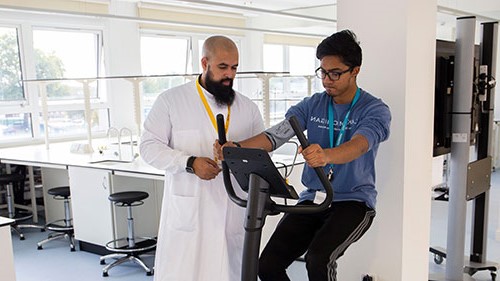Search
Healthcare Professions’ Support for England HTQ
Study level: HTQ courses
This course aims to equip you to become a professional, self-reflecting individual who can meet the demands of employers in the healthcare sector and thrive in a constantly changing world.
Course features
Year of entry
Location
CU London (Dagenham, London)
Study mode
Full-time
Duration
2 years full-time
Course code
HQ04
Start date
January 2026
March 2026
May 2026
June 2026
Course overview
By successfully completing this course, you should be able to demonstrate a sound knowledge of the basic concepts, values, and principles of healthcare practice, and learn the skills needed to perform effectively as a support worker in different settings in the healthcare sector.
Around a third of your learning will take place in diverse practice-based learning environments applying theoretical knowledge to real-world practice. You will receive ongoing support from experienced registered professionals. Please see the ‘How you will learn’ section for more details.
You will also complete a practical learning assessment and development portfolio log (PLAD) throughout your mandatory placements2. The PLAD is used to journal your experiences and document your progress, evidence your learning and demonstrate your competence to future employers.
Why you should study this course
Developed with the NHS and independent sector employers, this course aims to:
- equip you with the healthcare practice skills, knowledge, and understanding necessary to achieve high performance in the global health and social care environment.
- provide insight and understanding into the diversity of roles within the healthcare sector, recognising the importance of collaboration at all levels.
- provide opportunities for you to enter or progress in employment in healthcare, or progress to higher education qualifications such as an honour’s degree in healthcare or a related area.
- support you in understanding the local, regional, and global context of healthcare practice, management, and health promotion.
- provide you with opportunities to address contemporary health and care issues facing the sector, and society at large, with particular emphasis on integrated and compassionate care, and person-centred approaches to providing healthcare to individuals across their lifespan.

Accreditation and professional recognition
The course is being delivered under the Intellectual Property License of Pearson Education Limited.
This course is approved by the Institute of Apprenticeships and Technical Education as meeting the standards of Higher Technical Qualification (HTQ).

What you'll study
We regularly review our course content, to make it relevant and current for the benefit of our students. For these reasons, course modules may be updated.
How you'll learn
We understand that everyone learns differently, so this course will consist of structured teaching sessions which can include:
- on-campus lectures, seminars and workshops
- group work
- self-directed learning
- placements2.
Placements2 will be mandatory in both the first year (HNC) and second year (HND) of the course. You will be responsible for sourcing your own placements, although support will be given by CU London (Dagenham) staff. In order to successfully complete this HTQ you must complete the mandatory placement hours outlined below.
Teaching contact hours
As a full-time undergraduate student, you will study modules totalling 120 credits each academic year. A typical 20 credit module requires a total of 200 hours study. This is made up of teaching contact hours, guided and independent study.
Teaching hours:
Teaching hours vary depending on year of study and due to module selection. During your first year you can expect 15-18 teaching hours each week. You will also have the option to attend optional sessions including time with a progress coach or to meet with staff for advice and feedback. As you progress through your studies, teaching hours may reduce.
Placement hours:
The placement hours are in addition to the teaching hours above.
Within your first year of study (HNC) you will be required to complete a minimum requirement of 225 hours work placement or experience in a minimum of one statutorily registered healthcare setting, or any health-related social care setting providing direct healthcare to service users. (Minimum number of 75 hours at any one setting).
Within your second year of study (HND) you will be required to complete a minimum of 225 hours of work placement or experience in a minimum of two statutorily registered healthcare settings, or any health-related social care setting providing direct healthcare to service users. (Minimum number of 100 hours at each setting).
The HND requires a total of 450 mandatory placement hours to be completed over the two years.
Guided and independent study:
Throughout your studies, you will be expected to spend time in guided and independent study to make up the required study hours per module. You’ll be digging deeper into topics, review what you’ve learned and complete assignments. This can be completed around your personal commitments. As you progress through your studies, you’ll spend more time in independent study.
Online learning:
As an innovative university, we use different teaching methods including online tools and emerging technologies. So, some of your teaching hours and assessments may be delivered online.
Assessment
This course will be assessed using a variety of methods which will vary depending upon the module.
Assessment methods may include:
- essays
- group work
- presentations
- reports
- projects
- coursework
- individual assignments.
The Coventry University Group assessment strategy ensures that our courses are fairly assessed and allows us to monitor student progression towards achieving the intended learning outcomes.
Entry requirements
Typical entry requirements:
Fees and funding
| Student | Full-time | Part-time |
|---|---|---|
| UK | TBC per year | Not available |
| International | TBC per year | Not available |
For advice and guidance on tuition fees and student loans visit our undergraduate finance page and see the university’s Tuition Fee and Refund Terms and Conditions.
The University will charge the tuition fees that are stated in the above table for the first Academic Year of study. The University will review tuition fees each year. For UK (home) students, if Parliament permits an increase in tuition fees, the university may increase fees for each subsequent year of study in line with any such changes. Note that any increase is expected to be in line with inflation.
For international students, we may increase fees each year, but such increases will be no more than 5% above inflation. If you defer your course start date or have to extend your studies beyond the normal duration of the course (e.g. to repeat a year or resit examinations) the University reserves the right to charge you fees at a higher rate and/or in accordance with any legislative changes during the additional period of study.
We offer a range of international scholarships to students all over the world. For more information, visit our international scholarships page.
Tuition fees cover the cost of your teaching, assessments, facilities and support services. There may be additional costs not covered by this fee such as accommodation and living costs, recommended reading books, stationery, printing and re-assessments should you need them.
The following are additional costs not included in the tuition fees:
- Any optional overseas field trips or visits: £400+ per trip.
- Any costs associated with securing, attending or completing a placement (whether in the UK or abroad).
Irish student fees
The rights of Irish residents to study in the UK are preserved under the Common Travel Area arrangement. If you are an Irish student and meet the residency criteria, you can study in England, pay the same level of tuition fees as English students and utilise the Tuition Fee Loan.
Facilities
CU London Dagenham campus is in the Civic Centre building and is easily accessible by road, bus and rail.
Facilities include4:
- classrooms with interactive teaching capabilities
- Industry specialist health equipment
- comprehensive library and learning services
- study areas, laptops/open-access computers and social spaces
- student support and careers advice teams.
Facilities are subject to availability. Access to some facilities (including some teaching and learning spaces) may vary from those advertised and/or may have reduced availability or restrictions where the university is following public authority guidance, decisions or orders.
Careers and opportunities
Those who successfully complete the Higher National Diploma in Healthcare Professions’ Support HTQ will be able to demonstrate a sound knowledge of the basic concepts, values and principles of healthcare practice, and the skills to perform effectively as a support worker in different settings in the healthcare sector.
The skills offered as part of the Level 5 Higher National Diploma can provide you with the opportunity to work in many different areas of the health and social care sector.
Below are some examples of job roles the qualification could lead to:
- Occupational therapy assistant practitioner
- Operating department assistant practitioner
- Prehabilitation and rehabilitation assistant practitioner
- Maternity care assistant practitioner
- Community care assistant practitioner
- General health and care worker.
Further study
The Level 5 Higher National Diploma is recognised as meeting admission requirements to many relevant health and social care related courses2, for example:
How to apply
You may also like






